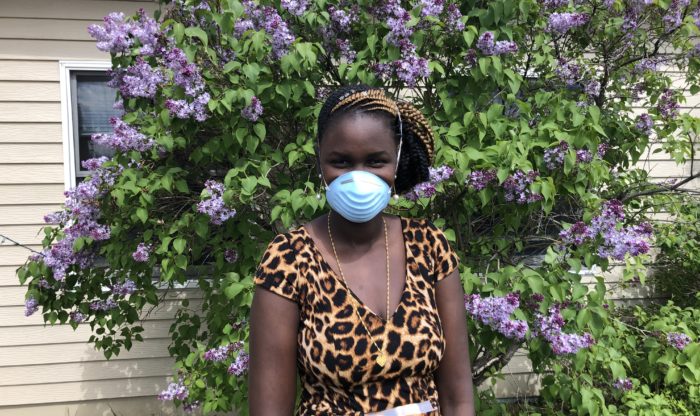
A large part of the RAIS program is education and employment services. RAIS staff works diligently to find meaningful employment for refugees. Refugees in Anchorage are often employed as essential workers and have served our community through the most challenging times. Refugees work in hospitals, grocery stores, and restaurants, providing care and services.
One of these clients is Leu. Leu worked closely with Hayat Khalaf, Education and Employment Specialist at RAIS, on cultural orientation, job training, and finding employment. When beginning her work with Hayat, little did Leu know just how impactful her employment in Alaska would be.
When a refugee client like Leu first arrives in Alaska, Hayat and the RAIS employment team get to work. The team works to help clients acquire a social security card and provides cultural orientation classes. Cultural orientation is a group of six classes including home safety and health, education, employment, US culture and laws, transportation, life in Alaska, financial literacy, and others. RAIS volunteers also help with job readiness and citizenship coursework.
Zori Opanasevych, Education and Employment Coordinator is another member of the RAIS team and works with clients to find those jobs and provide education. According to Zori, the work of finding employment opportunities may seem somewhat straightforward at first glance, but this responsibility goes far beyond simply finding clients a job.
It means RAIS staff work closely with employers and employees on an ongoing basis. RAIS staff help to bridge gaps and misunderstandings that may be caused by cultural differences and language barriers. RAIS staff attend interviews with clients, helping to interpret or provide encouragement. They also continuously follow up with employers and employees to make sure both groups are understanding one another, and their work relationship is successful.
Zori reflected on some of her experiences in supporting refugee clients in their employment. She recalled a time when a client was experiencing challenges working at their job as a cashier. She and a coworker got a fake register, monopoly money, and pretended to be angry, happy, and impatient customers. The client practiced responding to different situations and customers. The RAIS team will do whatever it takes in order to make sure refugee clients are supported in their employment.
Beyond classes, paperwork, and training is the important work of individualized support to each client in finding employment. Zori explains, “We don’t just find refugees jobs. We find them the best jobs possible. We provide personalized support and go out of our way to make sure refugees find successful and meaningful employment.” For Leu, this employment was in Environmental Services.
When Leu began doing her interviews, she was nervous. Interviews can be nerve-wracking and overwhelming for everyone, especially if you are still learning the language being spoken in the interview. Leu sometimes got quiet during her interviews because of her nerves. She said when she began to get quiet and nervous, Hayat would tell her, “You can speak English well, speak up!”, “You’ve got this!” This little bit of encouragement gave Leu more confidence and she quickly got a job in Environmental Services at Alaska Regional.
Leu started her job of sanitizing and cleaning patient rooms in early March, about one week before the first COVID case in Anchorage. When the first case of COVID was found in Anchorage it was at Leu’s hospital, Alaska Regional. After the first COVID patient was confirmed, many of Leu’s co-workers quit their jobs at the hospital. Leu didn’t quit, and after the first COVID positive patient was discharged, she was asked to clean their room.
Leu was scared, but she wanted to help, “I was scared in my heart, but it is my job and I like to care for people.” Leu’s commitment to helping her neighbors and her community is inspiring. She used this motivation and did her best to make sure the room was properly cleaned. When asked how she felt going into that room to sanitize and clean the space, her response showed just how dedicated she was to helping others “I didn’t want anyone to get sick from that room. I knew God and my PPE would protect me.”
After Leu cleaned the space, her supervisor came in and tested the room to make sure it was sanitized properly and rid of the virus, and it was. Leu’s essential work, attention to detail, and drive to help others was, and continues to be a critical part of managing the COVID crisis, and likely have saved many lives.
Because of Leu’s hard work and commitment to helping her community, she was promoted to the lead position in her department after only 2 months of work.
Leu’s hard work, talents, and bravery as an essential worker during COVID is an example of the amazing contributions being made by refugees across Alaska, and the United States each day. Her contributions are a pillar of our community.
Leu and other refugees all over the United States continue to help make their community a better place as essential workers and neighbors, especially during the COVID pandemic. Anchorage is a safer and better place for all because of all our essential workers. Our community is lucky to have such resilient new neighbors and dedicated service providers.
What amazing dedication, Leu! Our community is fortunate to have you.